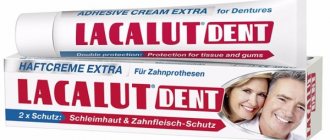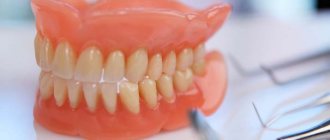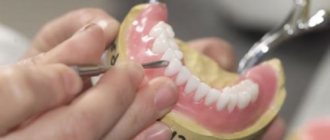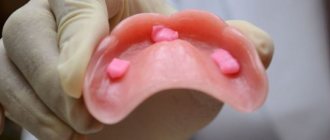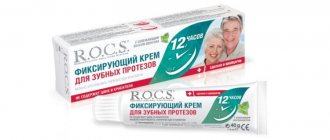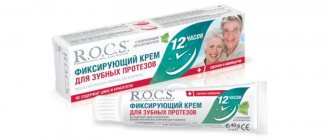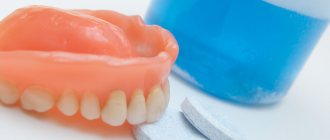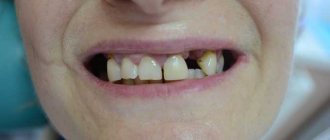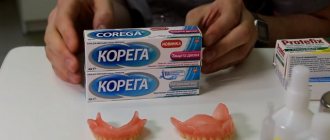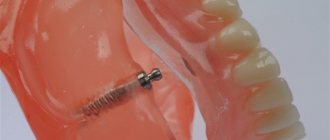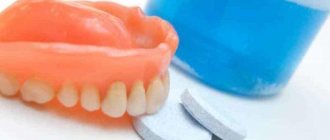About 50% of those who use removable dentures in everyday life indicate that the main problem in their use is insufficient strength of fixation in the oral cavity. This feature is the reason that when performing certain actions (eating, talking, laughing), the prosthesis can noticeably shift relative to its normal position.
To avoid such troubles, it is recommended to use special means that ensure high-quality fixation of dentures in the oral cavity.
Typically, when it comes to nylon and acrylic dentures, creams and gels are used. Gels are not inferior to creams in their functionality and differ from them only in consistency. Creams have a denser structure and are better suited for those who are just starting to use removable dentures.
Below we will consider the main means that are used for reliable and long-term fixation of dentures, their advantages and disadvantages.
ROCS
This drug was manufactured jointly by Russian and Swiss specialists and provides twelve-hour reliable fastening of the prosthesis, independent of the consumption of heated drinks and food.
Being distributed over the inner surface of the structure, this cream prevents small food particles from getting under the surface of the prosthesis. It should also be noted that the composition of this cream includes mint and menthol extracts, which significantly freshen breath and prevent the occurrence of unwanted odors.
Advantages
- Hydrophobicity. Cannot be washed off with any liquids.
- Lack of zinc element.
- Possibility of application to wet (not dried) dentures.
- The cream does not contain any artificial dyes or additives.
- Able to withstand the thermal effects of food, as well as drinks.
Flaws
- A high degree of thickness, which in some cases can complicate the uniform application of the cream.
- High price of the product.
In retail trade, the price for ROKS ranges from 250 to 400 rubles.
Fixing strips
A remedy such as fixing strips is more often used for various malocclusion pathologies.
In addition, strips are useful if it is difficult to get used to dentures. They are made from a special material that ensures good fixation of removable structures. Additionally, the strips also protect the gums from damage. This product is very easy to use. Usually, for good fixation, the strip is immersed in warm water for a few seconds. Then it is applied to the prosthesis and inserted into the mouth together with it.
Lacalut
Lacalut is a product of German technology of traditionally high quality. This cream, according to manufacturers, is capable of providing reliable adhesion of the prosthesis to the oral cavity for a period of more than 24 hours.
The cream forms a protective layer between the patient’s mucosa and the prosthesis, which effectively protects the oral cavity from potential injuries and rubbing by the edges of the prosthesis. This is especially true for those who have just started using removable dentures.
Lacalut cream contains a substance called aluminum lactate, which has a pronounced anti-inflammatory effect. This cream can be applied not only to dried, but also to moistened removable dentures.
Advantages
- Provides gentle operation of prostheses, minimizing possible injuries and abrasions in the process.
- It has a pleasant taste and aroma.
- Provides reliable long-term fixation of the prosthesis.
Flaws
- There may be a slight weakening of the fastening strength during the consumption of various hot foods or drinks, such as tea or coffee.
- Relatively high price.
The cost of Lacalut adhesive cream ranges from 300 to 450 rubles.
Glue
Denture adhesive acts as a soft cushion to cushion movement between the jaw and the structure during chewing. It is used for fastening both removable and permanent dentures (fixing a crown, temporarily strengthening a tooth or a broken bridge).
Adhesives are usually water-based.
The disadvantage of this product is associated with the gradual dissolution of the components and loss of effectiveness of the composition.
Excess glue can irritate your gums. The most commonly used glue is from Protefix, Corega, and Fittident.
"Protefix"
The cream of this brand ensures reliable fastening of the removable structure for up to 14 hours. Three different types of this product are produced, one of which, due to the absence of any foreign dyes and flavoring additives in its composition, is hypoallergenic.
Advantages
- Complete absence of foreign tastes and odors.
- High reliability of fixation.
- Economical.
Flaws
- Due to its liquid consistency, the fixative may leak out of the bottle if it is not held strictly vertically.
- Not a particularly convenient dosing system.
The cost of this drug varies depending on the volume of the tube, usually ranging from 150 to 390 rubles.
Side effects of using the compounds
Even the best denture creams can cause side effects. Most often, users indicate the following body reactions: swelling of the gums as a result of pressure from the structure or the development of an allergic reaction, headaches, taste disturbance, increased salivation, nausea, vomiting, discomfort in the digestive tract.
Various factors underlie such manifestations. Perhaps the drug is not suitable for a person due to the characteristics of its composition, or the buyer is prone to allergies. Another reason could be a violation of the recommendations for the use of a fixing agent specified in the instructions. In addition, there is a possibility of purchasing a counterfeit product. Therefore, when studying the rating of denture creams, you should not forget about other nuances of use.
Author: Chorny S.V. (Thank you for your help in writing the article and the information provided)
"Fittydent"
"Fittident" is considered one of the best drugs for fixing dentures in the oral cavity , however, if the patient has increased sensitivity of the mucous membranes, then during the periods when "Fittident" is used, unpleasant sensations such as burning and/or characteristic tingling sensation.
To ensure that these side effects are avoided, after the cream is applied, let it dry for about half a minute.
Advantages
- Long fixation time provided by this drug.
- Lack of distinct taste.
- After removing the denture, no traces of cream remain in the patient’s mouth.
Flaws
- Difficult to find in city pharmacies in small towns.
- The cream must be applied exclusively to the dry surface of the prosthesis.
- Very thick structure of the drug.
The cost ranges around 270 rubles.
Rating of the best creams
To choose the best cream for dentures, you will need to not just read user reviews online, but carefully study the composition of the product and consult with a specialist. In most cases, you will be able to give preference to a particular drug after using several options, that is, after testing it through personal experience. This is due to the individual characteristics of the body and the different properties of the materials of orthopedic structures. The rating of creams presented below is based on the opinion of both doctors and people who use them.
"The president"
The prosthesis attached with this drug tightly adheres to the mucous membrane due to the formation of an elastic layer of high density, which prevents food particles from entering under the surface of the prosthesis.
The consumption of hot drinks, as well as food, in some cases can lead to a weakening of the fixing strength.
Advantages
- Larger volume compared to analogues.
- High strength of prosthesis fixation.
- Low cost of the product.
Flaws
- Strong foreign taste.
- Eating can weaken (sometimes quite significantly) the fixation.
The cost of the drug is approximately 250 rubles.
Causes of tooth loss
Most often, removable orthodontic structures are installed when several teeth are lost. Sometimes congenital malformations lead to missing teeth. But more often the following reasons lead to their loss:
- consequences of dental disease (caries, periodontitis, etc.);
- jaw injuries;
- taking narcotic substances (pervitin, etc.)
Loss of teeth leads to such serious problems as speech impairment, deterioration in chewing food, and excessive stress on the remaining teeth with consequences such as their loosening and loss.
Often, the absence of teeth leads to psychological problems that prevent a person from realizing himself in many areas.
But thanks to the achievements of modern dentistry, missing teeth are now very effectively replaced with artificial dentures. Modern dental structures are ideally similar in appearance and functional properties to natural teeth; they are durable and comfortable.
"Korega"
All components of fixing preparations from this manufacturer are hypoallergenic and do not cause any side effects when used as intended.
Advantages
- Corega cream is equally suitable for use with both dry and wet dentures.
- It is characterized by low allergic activity and ease of use.
- It has a very low cost.
Flaws
- A short period of full fastening, which does not exceed four hours.
- Not waterproof, washes off quickly.
- It comes to an end pretty quickly.
- During the absorption of food, the prosthesis may fall out due to the dissolution of this product.
- If you use Corega cream for quite a long time, swelling of the mucous membrane may develop.
The average cost of this cream does not exceed 300 rubles.
We would also like to note that in case of any complications associated with the use of dentures, you should immediately contact the VivaDent clinic.
Features of prosthesis care
The presence of a prosthesis-fixing material does not relieve the patient from the procedure of daily cleaning of the dental structure. The effect of adhesive materials is calculated from several hours to one day.
In the morning and evening, the denture should be thoroughly rinsed and cleaned with a special soft brush. Experts recommend not using toothpastes with abrasives when brushing. Even if your denture is made of high-quality ceramic, harsh cleaning particles can damage it with daily use. Remains of fixing cream or powder can be easily removed using regular children's toothpaste. For those who prefer the best protection of their prosthesis from germs and dirt, there are specially designed tablets. They are dissolved in a glass of water where the prosthetic device is placed and left overnight for a cleansing effect.
You don’t have to endure the discomfort of a prosthetic device alone—contact your dentist at the slightest sign of chafing or pain. The prosthetic device itself can be subject to correction, its functional qualities can be adapted individually to the patient. And then the period of adjustment will become easy and pleasant for you, and fixing drugs will help you adapt even faster to your new life with new teeth.
Fixation of dentures in complete absence of teeth
The absence of teeth (complete edentia) does not allow a person to grind food when chewing. A toothless mouth leads to a violation of facial proportions (sunken mouth), defects in diction, the emergence of severe self-doubt and the inability to lead a full lifestyle.
Modern dentistry allows us to solve this problem with the help of fixed and removable structures. Most people, for various reasons (usually financial), use removable orthodontic structures in such cases. Often, problems arise related to the impossibility of their reliable fixation, even to the point of the prosthesis falling out at the most inopportune moments.
Most often, in case of complete absence of teeth, removable structures made of acrylic plastic are used. Typically, glue, cream or gel is used to fix them.
For many patients, nylon bridges are attached using a flexible backing. This method of fastening is convenient and safe for patients, as it allows the prosthesis to be firmly attached to the mouth.
How to properly fix a complete denture
To properly fix a denture in the absence of teeth, you must adhere to the following rules:
- Thoroughly clean the gums and the denture itself.
- Apply a little product evenly to the recesses in the structure.
- Put on the denture and press it firmly against the gums for 5 seconds.
- Refrain from eating and drinking for 5 minutes.
- If it contains a zinc fixative, the product should not be used more than once a day. In this case, you should immediately pay attention to any ailments such as nausea, vomiting, headache or weakness.
Your prosthetist can best tell you which product is best to use for fixing removable dental structures. Sometimes patients have to use several products until they can find the most suitable fixative for themselves.
Sources used:
- “Removable dentures: a textbook” (Mironova M.L.)
- “Partial removable dentures” (Zhulev E.N.)
- Complications during dental prosthetics and their prevention / M.G. Bhushan, H.A. Kalamkarov. — M.: Shtintsa
